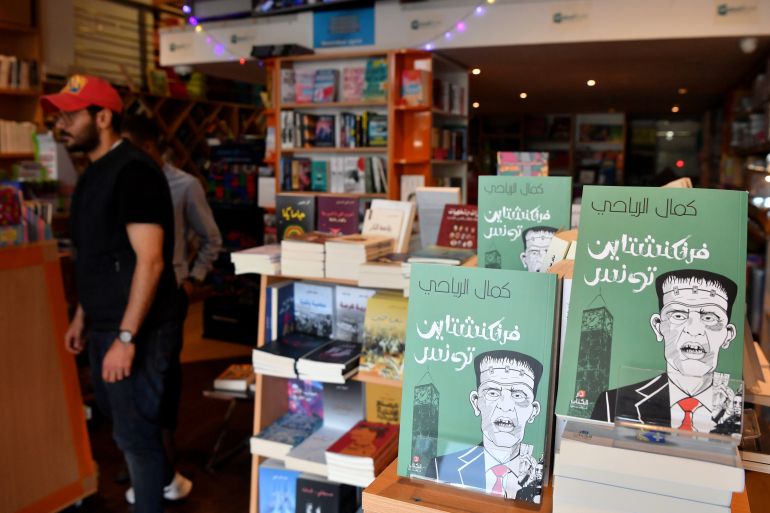‘Dangerous precedent’: Tunisian police target books
Two books are confiscated, and a publishing house’s stand is closed down at the Tunis International Book Fair.

Tunisian authorities have seized two books at a book fair and temporarily closed down a publishing house’s pavilion, moments after the president had told reporters about the importance of combatting rigid thinking.
Friday’s first confiscation, decried by critics as a further step in President Kais Saied’s crackdown on dissenting voices, was of the book Tunisian Frankenstein by Kamel Riahi.
Keep reading
list of 3 itemsTunisian opposition leader Ghannouchi jailed ahead of trial
Arrests of Tunisia opposition leaders draw global condemnation
The seizure came right after Saied told reporters at the opening of the Tunis International Book Fair: “It is important to liberate thinking because we cannot accomplish anything with rigid thoughts.”
“I consider this a dangerous precedent for the suppression of freedom of expression,” Riahi told Al Jazeera.
Tunisian Frankenstein is about the collapse of democracy in Tunisia, Riahi said, along with the decline of public freedoms and Saied’s violations of the Tunisian Revolution’s values.
![[Courtesy of Kamel Rihai]](/wp-content/uploads/2023/05/WhatsApp-Image-2023-05-01-at-14.28.50-1682941044.jpeg?w=770&resize=770%2C578)
Frankenstein and a drunken ship
Officials also closed down the stand of Riahi’s publishing house, Dar el-Kitab, only to reopen it a day later after other stands closed in solidarity.
Dar el-Kitab chief Habib Zoghbi said in a video on social media on Saturday that authorities justified their action by claiming the book had not been authorised for display, even though it was included in a list sent a week earlier to the fair’s administration.
Also on Saturday, security officers returned to the fair and picked up samples of another book by author and journalist Nizar Bahloul titled Kais the First, President of a Drunken Ship and asked the publisher to withdraw all other copies, the author said.
Bahloul, who is also the editor of the online news outlet Business News, was the subject of a police investigation last year after publishing a critical opinion piece on Prime Minister Najla Bouden.
The police said they have to “verify information” on the book, Bahloul told Al Jazeera, noting that officers did not provide further details. The book was published in March 2021 and had been exhibited at the fair for two consecutive years.
“This is the first time something like this has happened since the 2011 revolution,” Bahloul said.
Saied “gave a speech about freedom of thought to open the country’s national book fair, only to then have security agents of the state order the confiscation of a book”, a statement from PEN America said.
The Tunisian Federation of Publishers (FTE) also deplored the move, stressing the importance of the book fair as a “breath of fresh air” in the cultural life of the country.
“The FTE deplores this incident, and calls on the Minister of Cultural Affairs to reconsider this unprecedented and excessive decision,” the federation said on social media.
“It seems that after discussion, the stand of Al Kitab reopens. But the book remains seized, without a court decision,” the organisation said. “This is a clear message for the entire profession, in the broad sense, authors, publishers, booksellers.”
The book fair was not the only target. Two sources told Al Jazeera that police officers also entered the popular bookstore Al Kitab and asked that it stop selling Riahi’s book.
In a picture shared with Al Jazeera, the shop’s window displayed the book on Sunday with a red chain wrapped around it on top of former United States Secretary of State Madeleine Albright’s book Fascism.
![[Courtesy of ]](/wp-content/uploads/2023/05/WhatsApp-Image-2023-05-01-at-14.29.13-1682941037.jpeg?w=770&resize=770%2C462)
‘A clear message’
More than a decade ago, weeks of protests rocked the North African country, leading to the Jasmine Revolution, which triggered Arab Spring protests across the region and toppled longtime President Zine El Abidine Ben Ali.
The departure of Ben Ali paved the way for a democratically elected government led by Ennahdha, a party aimed at forging Islamic values with political pluralism.
But less than a decade later, Tunisia found itself in a dire economic crisis as inflation skyrocketed and unemployment rose, resulting in a landslide victory in 2019 for an independent candidate, Saied, a former constitutional lawyer with an awkward public manner who appealed to voters on the promise to clean up the system.
Two years after he was elected, Saied dissolved parliament and pushed forward a new constitution in 2021 in what critics called a “self-coup”. He started ruling by decree, consolidating one-man rule and ordered a wave of arrests.
His bluntest move was the detention in April of Ennahdha’s co-founder and leader of the opposition, Rashed Ghannouchi, after putting more than 20 other members of the opposition behind bars since the start of the year. In February, Tunisian security forces also raided the house of Noureddine Boutar, the head of Tunisia’s most important independent news outlet, Mosaique radio, and started criminal proceedings against the head of Tunisia’s Journalists Syndicate, Mohamed Mehdi Jelassi.
“Saied has been systematically suffocating the last embers of Tunisia’s flawed but precious young democracy – the first of its kind in the Arab world – and, along with it, the last gasps of remaining political oxygen with which writers and journalists can criticise him and his henchmen,” said Monica Marks, assistant professor of Middle East politics at New York University, Abu Dhabi.
“The assaults on Tunisia’s Book Fair this weekend – and security forces’ corresponding targeting of publishers, booksellers and even book buyers – are part of Saied’s ongoing and ever-escalating efforts,” Marks said.
Tunisia climbed 30 places from 164 in the Reporters without Borders’ Press Freedom Index after the Jasmine Revolution. It kept climbing until 2021 when it reversed its trajectory for the first time, from 73 to 94 the following year.
In September, the Tunisian government passed a law imposing up to five years in prison for spreading “rumours and fake news”, a move slammed by the main journalists union as an attack on freedom of expression.